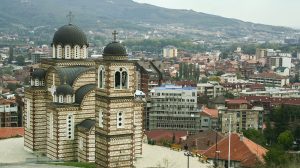Georgia must adapt its national security strategies to counter not only traditional aggression but also the ‘grey zone operations’ that threaten its sovereignty in what is a low-intensity, yet persistent, conflict.
The improvement of Georgia’s security system and the search for new approaches and solutions is a continuous process. And this is not surprising, as our region and the world have been in constant transformation since our regained independence, with regional and global centres of power realigning from time to time, new centres forming, military or political alliances expanding, shrinking or modifying.
Additional risks and challenges arise as a result of profound geopolitical, economic and social processes. This, in turn, requires continuous improvement of the national security system and adequate adaptation to changing risks.
- Football, protests, and the emergence of New Georgia
- ‘It’s never been easier to pick a side’
- Georgia revives deep-water port development, this time with help from China
It is particularly noteworthy here that anti-Georgian and anti-state actions have not always taken the form of open aggression. At the same time, it should be noted that the encroachment on the sovereignty and territorial integrity of our country is almost continuously carried out by means of so-called ‘grey zone operations’, measures that qualify it as a ‘low-intensity conflict’.
In other words, although the actions of the aggressor do not formally bear the signs of a declaration of war, by their forceful nature they are aimed at reducing the defence capability of the target country, undermining its security and state foundations and limiting the operational space and resources for the fulfillment of national tasks.
As such, in this case, it is not a classic casus belli, but rather that the aggressor places the victim under its influence in a form (which includes, inter alia, neutralising appropriate international support or imposing substantial restrictions on such support) that does not require the engagement of armed forces for the purpose of overt aggression.
To put it another way, the purpose of ‘grey operations’ in a ‘low-intensity’ format is to disrupt the state resilience of the target country and deplete its resources. The Center for Strategic and International Security interprets this phenomenon in a much more complex way, noting that such operations are “between routine management and open warfare” and that the initiator of “grey operations” tries to exploit certain advantages in a way that does not “cross the line into open warfare”.
To further simplify the issue, this is how an aggressor employs a strategy that seeks to obtain a desired economic, military, diplomatic, and political outcome while avoiding a direct and costly response from the other side.
Appropriate influence and pressure may imply limiting the target country’s access to a promising market of the aggressor (remember the closure of the Russian market for Georgian products at one time). Also, the aggressor country may take care to maximise the diplomatic isolation of the target country from third countries (such as China’s attitude towards Taiwan).
Importantly, an aggressor country may forgo the use of military units and rely wholly or partially on law enforcement or other paramilitary structures to conduct ‘grey’ or ‘low-intensity’ operations. Moreover, certain civilian resources can be used for this purpose. All of this makes it possible to “go along the edge” in conducting a violent campaign, which in turn reduces the possibilities for proper legal qualification and countermeasures under international law.
What are we to counter with? What should we care about?
When it comes to the response of the Georgian side, we picture three categories of so-called defensive barriers: one at the national level, the second in coordination with our international partners, and the third the implementation of measures aimed at increasing the geo-economic function and usefulness of the country.
At the national level, ‘low-intensity’ operations usually aim to encroach on Georgian air, maritime and economic space and will continue to do so in the future.
With regard to air and water, the implementation of modern surveillance systems remains a priority issue. Here we are mainly referring to cheap drones and relevant sensors, which are needed for timely detection of intrusion into Georgian air and sea space and development of the necessary response.
Of particular importance here is the improvement of the Georgian military and industrial complex and the fulfillment of at least the basic requirements for effective surveillance. It is also necessary to further improve the capabilities of the Georgian Coast Guard and bring it closer to modern standards.
With regard to the economic ecosystem as the cornerstone of any effective security system and in the context of growing economic nationalism in the world, not only the quantity of investments is important, but also their quality.
Thus, given the current threats, we believe that it is unacceptable to consider any investment as desirable for our country. The time has come to learn how to distinguish and select them. For this purpose, we believe it is advisable to check investments, to introduce a screening mechanism by law. We should also note that many developed economic systems use this method today.
In addition to the above, a large and separate place should be given to the issue of economic security in the national security doctrine of Georgia. This special attention, again, is dictated by the modern and multifaceted understanding of the concept of ‘security’. Let us agree that national security is unthinkable without a unified set of economic measures, because no one will consider and talk to a weak, poor country with constant requests for help.
It has to be particularly noted that the economic security dimension should be strengthened in the format of the National Security Council. As one of the possible developments, we do not rule out the separate creation of an Economic Security Council or its institutionalisation within the framework of the National Security Council. Moreover, speaking about the structural approach, we also consider as a possible subject of discussion the introduction of the position of the Minister of Economic Security in the government of Georgia with corresponding supervisory scope and functions.
In any case, whether under the auspices of the Economic Security Council or the Minister of Economic Security, one of the fundamental tasks should be the continuous monitoring and analysis of risks and threats to Georgia’s economic security, and this process should be objectively reflected in a periodic document on economic threat. Along with the structural approach, the feasibility of legislation ensuring economic security (such as Georgia’s ‘Law on Economic Security’) should equally be discussed.
Measures of international scope
From this point of view, the efforts of the Georgian side should be even better focused on the Black Sea factor, which from a geopolitical and security point of view is both a great challenge and a great opportunity.
If we focus on a geopolitical component, we still want to put forward the initiative of a framework document of the Black Sea Declaration, which would serve the political and economic integration of the countries of the region, including a modern format of consultations, adapted to the time and the need for new channels of communication.
Such a declaration will emphasize the importance of the Black Sea region for world and regional peace and stability. With regard to a number of important topics, this document will, to name but few, underline a need to mobilise investment funds for the diversification of regional infrastructure, as well as the need to implement socially and environmentally sustainable projects in the region and outline the directions of regional free trade agreements and blocs.
As for the security dimension in the Black Sea, we envision relevant cooperation (similar to NORDEFCO or another model) between NATO member countries (Romania, Turkey, Bulgaria) and non-member countries (Georgia, Ukraine). Such a platform would be helpful, inter alia, for discussing security and defence policy and identifying common risks and challenges, as well as providing for joint actions to ensure peace and stability in the Black Sea region.
All in all, forming a Black Sea mini-alliance is all the more relevant if we take into account that in recent years the representation of NATO in the Black Sea has been characterised by a significant lack of potential and resources. Moreover, on the eastern flank of the alliance perimeter—from the Baltic Sea to the Black Sea—this sense of scarcity was compounded by apparent asymmetry or inequality.
Last but not least, strengthening of Georgia’s ties with Western partners is given critical weight. In our opinion, one of the real manifestations of this cooperation is the establishment in Tbilisi of a special joint centre of excellence for combating hybrid warfare and disinformation in the form of an analogue of the centre for combating hybrid threats operating in Helsinki. In parallel with the neutralisation of hybrid-disinformation manifestations in our country, such a centre can also respond to regional.
Enhancing the geo-economic function
We believe that, on the one hand, increasing a country’s usefulness in a network of regional trade, transportation or other types of economic linkages and, on the other hand, the joint interest and co-ownership of actors with a voice in realising these benefits, will help to better manage and mitigate future risks.
The above-mentioned approach was the basis for the cross-border projects launched by Georgia in the 1990s (Baku-Supsa, Baku-Tbilisi-Ceyhan, Baku-Tbilisi-Erzurum, and later Baku-Tbilisi-Kars), which gave our country “its own self” in the eyes of the outside world.
However, it is necessary to remember that strengthening the “own self” and filling it with new content is a constant, continuous process in which fatigue and boredom are excluded. A number of major projects, including the Middle Corridor and the Black Sea Electric Cable, which should give Georgia a unique role in the larger regional geo-economic structure, at least for several decades to come, serve this very purpose.
Unlike many news and information platforms, Emerging Europe is free to read, and always will be. There is no paywall here. We are independent, not affiliated with nor representing any political party or business organisation. We want the very best for emerging Europe, nothing more, nothing less. Your support will help us continue to spread the word about this amazing region.
You can contribute here. Thank you.







Add Comment